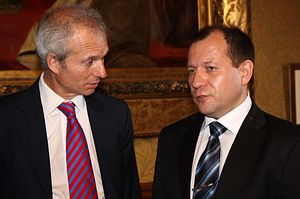The Committee Against Torture, a Russian nongovernmental organization which advocated over the past 15 years on behalf of torture victims, provided legal and financial support, and investigated allegations of torture and mistreatment in Russia, will be closing down after losing an extended battle against the state.
Founded in 2000 in Nizhny Novgorod by a number of Russian human rights defenders the group says over the years it has taken more than 1,800 reports of human rights violations, established 120 cases of torture or mistreatment through investigations and filed 87 complaints with the European Court of Human Rights. In addition, the group says its activities have led to the conviction of 107 officials, the annulment of over 600 unlawful court decisions, and won more than 42 million rubles in compensation for victims.
In January, the Russian Justice Ministry added the Committee Against Torture to the list of “foreign agents.” The group, led by Igor Kalyapin, decided to fight the label.
A law enacted nationally in Russia in 2012 requires NGOs that receive foreign funding and engage in “political activities” to register with the state, declare the status on their materials, and accept heightened regulations and inspections. Human Rights Watch is unequivocal about the law’s aim: “Because in Russia ‘foreign agent’ can be interpreted only as ‘spy’ or ‘traitor,’ there is little doubt that the law aims to demonize and marginalize independent advocacy groups.”
While the law was passed in 2012, enforcement gradually increased in 2013 after President Vladimir Putin, speaking to a gathering of the Federal Security Service (the main successors to the KGB), extorted law enforcement to use the law.
“Today we have established a new order for NGOs in Russia, in particular as they relate to funding from abroad,” Putin said, according to the Wall Street Journal. “These laws should certainly be executed. Any direct or indirect interference in our internal affairs—any form of pressure on Russia, our allies and partners—is unacceptable.”
Kalyapin said in January that he would fight the label, but that if the organization lost it would be forced to close or merge with another group. In an interview with RFE/RL, Kalyapin confirmed that the group does receive foreign funding, but pushed back on the idea that they had engaged in political activities.
In May, a judge ruled that organization was, indeed, a “foreign agent.” An article in the Guardian drew out the seemingly contradictory nature of the case:
In challenging the label, CAT and the court became tangled in a debate – at times leaning on the philosophical – about the hopelessly broad tenets that lie at the centre of the law: over what constitutes “state policy” and “political activity”, terms which have been applied in damaging trials against NGOs on a case-by-case basis.
The group’s founder, Igor Kalyapin, explained the incongruity of the state’s accusation to Russian media: “By the prosecutors’ logic, it turns out that state policy is torture in police departments and the covering up of torture by investigative bodies,” he said.
In early July, the court in Nizhny Novgorod upheld the earlier decision that the Committee Against Torture must accept the “foreign agents” label and the associated reporting and notification burdens. Friday, according to the The Moscow Times, a majority of the members voted to close (“liquidate”) the organization. While Russian authorities are quick to point out that the law does not force NGOs to close, many see the burdens associated with the law as essentially the same thing.
In late June, the Committee Against Torture held a rally in support of the UN International Day in support of victims of torture. The group did not print “foreign agent” on its leaflets–as the 2012 law requires. Interfax reports that “the breach entails an administrative fine of between 100,000 and 300,000 rubles for officials and between 300,000 and 500,000 rubles for legal entities.”
The Committee Against Torture has been under pressure in other ways as well–in December their Chechen office was set on fire and in June it was ransacked my masked men.
According to Human Rights Watch, the registry of “foreign agents” now includes over 70 NGOs, a minority of which voluntarily registered and a majority which were forcibly registered, many with pending civil cases and fines.
For many analysts, what is happening in Russia with regard to the crackdown on NGOs is a forecast of what will happen in Central Asia in the coming months or years. Kyrgyzstan’s own “foreign agents” law is moving through parliament.































